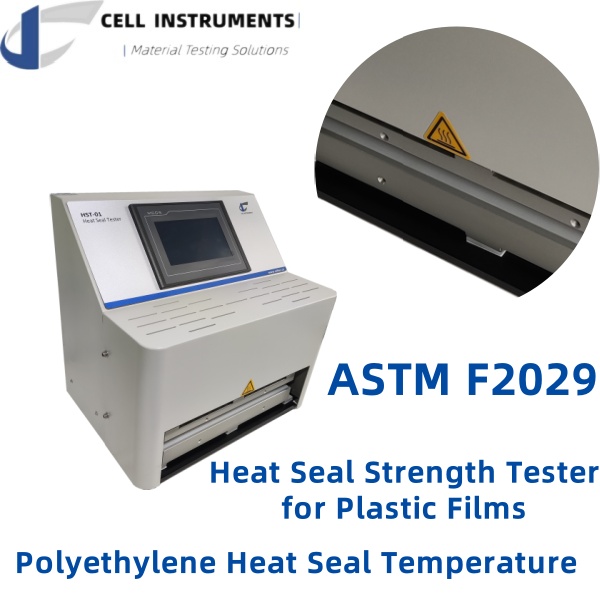Introduction
Polyethylene heat seal temperature plays a crucial role in determining the strength and integrity of heat seals in plastic films. This factor is essential in various industries, particularly in packaging, where the quality of seals directly affects product safety and shelf life. In this article, we will delve into the importance of understanding the correct polyethylene heat seal temperature, how it relates to the heat seal strength of plastic films, and the significance of adhering to standards like ASTM F2029.
The Importance of Polyethylene Heat Seal Temperature
The heat seal temperature of polyethylene is a key determinant of the seal’s quality. When sealing plastic films, particularly in packaging applications, achieving the correct temperature is vital for creating a strong, uniform seal. If the temperature is too low, the seal may be weak or incomplete, leading to potential leaks or contamination. Conversely, an excessively high temperature can damage the material, resulting in brittle seals that are prone to failure.
Understanding Heat Seal Strength in Plastic Films
Heat seal strength refers to the force required to separate two bonded layers of material. It is a critical measure of the effectiveness of a seal, particularly in applications where the integrity of the seal is paramount, such as in food and medical packaging. The strength of a heat seal is influenced by several factors, including the type of material, the pressure applied during sealing, the duration of heat application, and, importantly, the heat seal temperature.
ASTM F2029: The Standard for Heat Sealability Testing
ASTM F2029 outlines the standard test method for making heat seals to determine the heat sealability of flexible webs. This standard is widely recognized in industries that require precise and reliable sealing methods. ASTM F2029 specifies the procedures for preparing test specimens, selecting test parameters, conducting the sealing process, and measuring the seal strength. By following these guidelines, manufacturers can ensure consistent and reliable heat seals that meet industry standards.
Achieving Optimal Polyethylene Heat Seal Temperature
To achieve optimal heat seal strength, it is essential to carefully control the sealing temperature. The following steps outline the process for determining and maintaining the correct polyethylene heat seal temperature:
- Material Selection: Different polyethylene grades may require different sealing temperatures. It is crucial to select a material that is compatible with the desired sealing temperature.
- Temperature Testing: Conduct preliminary tests to determine the ideal temperature range for the material. This range should produce a strong, uniform seal without causing damage to the material.
- Parameter Adjustment: Adjust sealing parameters such as pressure and dwell time in conjunction with temperature to achieve the best results. Record these parameters for consistency in production.
- Ongoing Monitoring: Continuously monitor the sealing process to ensure that the temperature remains within the optimal range. Any deviation from the set temperature can compromise the seal quality.
Applications of Polyethylene Heat Sealing
The proper application of heat seal temperature in polyethylene is critical across various industries:
- Packaging Industry: Ensuring the integrity of flexible packaging materials is vital for maintaining product freshness and safety.
- Medical Devices: Reliable heat seals in sterile packaging prevent contamination and ensure patient safety.
- Pharmaceuticals: Consistent seal strength in blister packs and other packaging ensures product integrity and compliance with regulatory standards.
- Textiles: Heat-sealed fabrics used in technical textiles require strong, durable seals for performance and longevity.
Recommendation: Cell Instruments Polyethylene Heat Seal Temperature Tester
For industries requiring precise control over heat seal temperatures, the Cell Instruments Heat Seal Tester is an excellent choice. This advanced device ensures that your polyethylene materials meet stringent quality standards as outlined by ASTM F2029. With features like automation and customization, it provides consistent, accurate results, making it an essential tool for quality assurance.
FAQ
Q1: What is the ideal heat seal temperature for polyethylene?
A: The ideal heat seal temperature for polyethylene varies depending on the material grade and thickness, but it generally ranges between 120°C to 160°C. Preliminary testing is recommended to determine the exact temperature for your specific material.
Q2: How does ASTM F2029 ensure the reliability of heat seals?
A: ASTM F2029 provides standardized procedures for making and evaluating heat seals, ensuring that the seals meet industry standards for strength and uniformity.
Q3: What happens if the heat seal temperature is too high?
A: If the temperature is too high, it can cause the material to degrade or burn, leading to brittle or weak seals that are prone to failure.
Q4: Can the Cell Instruments Heat Seal Tester be used for materials other than polyethylene?
A: Yes, the Cell Instruments Heat Seal Tester is versatile and can be used for various materials, including plastics, textiles, paper, and adhesives.
Q5: How can I ensure consistent seal strength in my packaging process?
A: Consistent seal strength can be achieved by carefully controlling sealing parameters such as temperature, pressure, and dwell time, and by regularly monitoring and adjusting these parameters as needed.
Related Products
Related Article
Heat Seal Strength Test Method
Seal Strength of Plastic Films
Heat Seal Equipment for Laboratory Testing
Laboratory Heat Sealer for Film Testing
Plastic Film Heat Seal Testing


